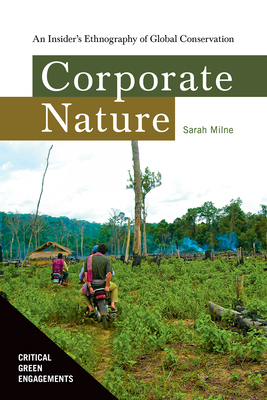Corporate Nature: An Insider's Ethnography of Global Conservation

Corporate Nature: An Insider's Ethnography of Global Conservation
In 2012, Cambodia's most prominent environmental activist was brutally murdered in a high-profile conservation area in the Cardamom Mountains. Tragic and terrible, this event magnifies a crisis in humanity's efforts to save nature: failure of the very tools and systems at hand for advancing global environmental action. Sarah Milne spent more than a decade working for and observing global conservation projects in Cambodia. During this time, she saw how big environmental NGOs can operate rather like corporations. Their core practice involves rolling out appealing and deceptively simple policy ideas, like Payments for Ecosystem Services (PES). Yet, as policy ideas prove hard to implement, NGOs must also carefully curate evidence from the field to give the impression of success and effectiveness. In Corporate Nature, Milne delves inside the black box of mainstream global conservation. She reveals how big international NGOs struggle in the face of complexity--especially in settings where corruption and political violence prevail. She uses the case of Conservation International's work in Cambodia to illustrate how apparently powerful NGOs can stumble in practice: policy ideas are transformed on the ground, while perverse side effects arise, like augmented authoritarian power, illegal logging, and Indigenous dispossession. The real power of global conservation NGOs is therefore not in their capacity to control what happens in the field but in their capacity to ignore or conceal failings. Milne argues that this produces an undesirable form of socionature, called corporate nature, that values organizational success over diverse knowledges and ethical conduct.
PRP: 663.00 Lei
Acesta este Pretul Recomandat de Producator. Pretul de vanzare al produsului este afisat mai jos.
596.70Lei
596.70Lei
663.00 LeiIndisponibil
Descrierea produsului
In 2012, Cambodia's most prominent environmental activist was brutally murdered in a high-profile conservation area in the Cardamom Mountains. Tragic and terrible, this event magnifies a crisis in humanity's efforts to save nature: failure of the very tools and systems at hand for advancing global environmental action. Sarah Milne spent more than a decade working for and observing global conservation projects in Cambodia. During this time, she saw how big environmental NGOs can operate rather like corporations. Their core practice involves rolling out appealing and deceptively simple policy ideas, like Payments for Ecosystem Services (PES). Yet, as policy ideas prove hard to implement, NGOs must also carefully curate evidence from the field to give the impression of success and effectiveness. In Corporate Nature, Milne delves inside the black box of mainstream global conservation. She reveals how big international NGOs struggle in the face of complexity--especially in settings where corruption and political violence prevail. She uses the case of Conservation International's work in Cambodia to illustrate how apparently powerful NGOs can stumble in practice: policy ideas are transformed on the ground, while perverse side effects arise, like augmented authoritarian power, illegal logging, and Indigenous dispossession. The real power of global conservation NGOs is therefore not in their capacity to control what happens in the field but in their capacity to ignore or conceal failings. Milne argues that this produces an undesirable form of socionature, called corporate nature, that values organizational success over diverse knowledges and ethical conduct.
Detaliile produsului








